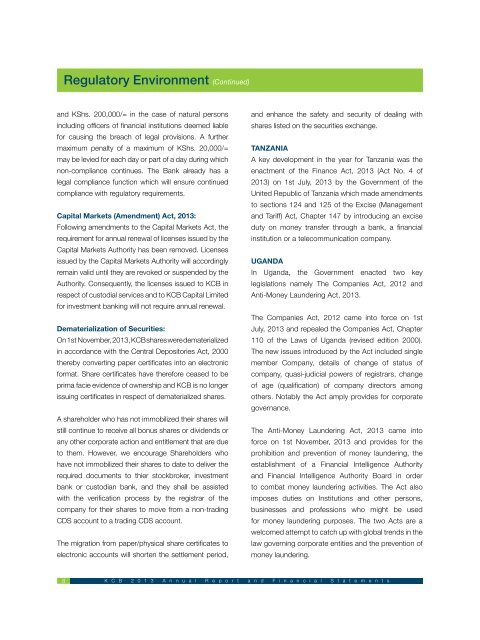1lzXuhv
1lzXuhv
1lzXuhv
You also want an ePaper? Increase the reach of your titles
YUMPU automatically turns print PDFs into web optimized ePapers that Google loves.
Regulatory Environment (Continued)<br />
and KShs. 200,000/= in the case of natural persons<br />
including officers of financial institutions deemed liable<br />
for causing the breach of legal provisions. A further<br />
maximum penalty of a maximum of KShs. 20,000/=<br />
may be levied for each day or part of a day during which<br />
non-compliance continues. The Bank already has a<br />
legal compliance function which will ensure continued<br />
compliance with regulatory requirements.<br />
Capital Markets (Amendment) Act, 2013:<br />
Following amendments to the Capital Markets Act, the<br />
requirement for annual renewal of licenses issued by the<br />
Capital Markets Authority has been removed. Licenses<br />
issued by the Capital Markets Authority will accordingly<br />
remain valid until they are revoked or suspended by the<br />
Authority. Consequently, the licenses issued to KCB in<br />
respect of custodial services and to KCB Capital Limited<br />
for investment banking will not require annual renewal.<br />
Dematerialization of Securities:<br />
On 1st November, 2013, KCB shares were dematerialized<br />
in accordance with the Central Depositories Act, 2000<br />
thereby converting paper certificates into an electronic<br />
format. Share certificates have therefore ceased to be<br />
prima facie evidence of ownership and KCB is no longer<br />
issuing certificates in respect of dematerialized shares.<br />
A shareholder who has not immobilized their shares will<br />
still continue to receive all bonus shares or dividends or<br />
any other corporate action and entitlement that are due<br />
to them. However, we encourage Shareholders who<br />
have not immobilized their shares to date to deliver the<br />
required documents to thier stockbroker, investment<br />
bank or custodian bank, and they shall be assisted<br />
with the verification process by the registrar of the<br />
company for their shares to move from a non-trading<br />
CDS account to a trading CDS account.<br />
The migration from paper/physical share certificates to<br />
electronic accounts will shorten the settlement period,<br />
and enhance the safety and security of dealing with<br />
shares listed on the securities exchange.<br />
Tanzania<br />
A key development in the year for Tanzania was the<br />
enactment of the Finance Act, 2013 (Act No. 4 of<br />
2013) on 1st July, 2013 by the Government of the<br />
United Republic of Tanzania which made amendments<br />
to sections 124 and 125 of the Excise (Management<br />
and Tariff) Act, Chapter 147 by introducing an excise<br />
duty on money transfer through a bank, a financial<br />
institution or a telecommunication company.<br />
Uganda<br />
In Uganda, the Government enacted two key<br />
legislations namely The Companies Act, 2012 and<br />
Anti-Money Laundering Act, 2013.<br />
The Companies Act, 2012 came into force on 1st<br />
July, 2013 and repealed the Companies Act, Chapter<br />
110 of the Laws of Uganda (revised edition 2000).<br />
The new issues introduced by the Act included single<br />
member Company, details of change of status of<br />
company, quasi-judicial powers of registrars, change<br />
of age (qualification) of company directors among<br />
others. Notably the Act amply provides for corporate<br />
governance.<br />
The Anti-Money Laundering Act, 2013 came into<br />
force on 1st November, 2013 and provides for the<br />
prohibition and prevention of money laundering, the<br />
establishment of a Financial Intelligence Authority<br />
and Financial Intelligence Authority Board in order<br />
to combat money laundering activities. The Act also<br />
imposes duties on Institutions and other persons,<br />
businesses and professions who might be used<br />
for money laundering purposes. The two Acts are a<br />
welcomed attempt to catch up with global trends in the<br />
law governing corporate entities and the prevention of<br />
money laundering.<br />
27 8<br />
K C B 2 0 1 3 A n n u a l R e p o r t a n d F i n a n c i a l S t a t e m e n t s


